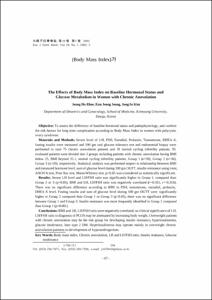KUMEL Repository
1. Journal Papers (연구논문)
1. School of Medicine (의과대학)
Dept. of Obstetrics & Gynecology (산부인과학)
비만 지표 (Body Mass Index)가 만성 무배란 여성의 혈중 기저 호르몬치와 포도당 대사에 미치는 영향
- Alternative Author(s)
- Rhee, Jeong Ho; Kim, Jong In
- Journal Title
- 대한불임학회잡지
- ISSN
- 1226-2951
- Issued Date
- 2002
- Abstract
- Objective: To assess the difference of baseline hormonal status and pathophysio logy, and confirm the risk factors for long term complication according to Body Mass Index in women with polycystic ovary syndrome.
Materials and Methods: Serum level of LH, FSH, Estradiol, Prolactin, Testosterone, DHEA –S, fasting insulin were measured and 100 gm oral glucose tolerance test and endometrial biopsy were performed in total 75 chronic anovulation patients and 20 normal cycling infertility patients. 95 evaluated patients were divided into 3 groups including patients with chronic anovulation having BMI below 25, BMI beyond 25.1, normal cycling infertility patients, Group 1 (n=39), Group 2 (n=36), Group 3 (n=20), respectively. Statistical analysis was performed respect to relationship between BMI and measured hormone level, sum of glucose level during 100 gm OGTT, insulin resistance using t-test, ANOVA test, Post Hoc test, Mann-Whitney test. p<0.05 was considered as statistically significant.
Results: Serum LH level and LH/FSH ratio was significantly higher in Group 1, compared than Group 2 or 3 (p<0.05), BMI and LH, LH/FSH ratio was negatively correlated (r=-0.351, r=-0.318). There was no significant difference according to BMI in FSH, testosterone, estradiol, prolactin, DHEA-S level. Fasting insulin and sum of glucose level during 100 gm OGTT were significantly higher in Group 2 compared than Group 1 or Group 3 (p<0.05), there was no significant difference between Group 1 and Group 3. Insulin resistance was more frequently identified in Group 2 compared than Group 1 (p=0.001).
Conclusions: BMI and LH, LH/FSH ratio were negatively correlated, so clinical significance of LH, LH/FSH ratio in diagnosis of PCOS may be attenuated by increasing body weight. Overweight patients with chronic anovulation may be the risk group for developing insulin resistance, hyperinsulinemia, glucose intolerance, later type 2 DM. Hyperinsulinemia may operate mainly in overweight chronic
anovulation patients in development of hyperandrogenism.
- Alternative Title
- The Effects of Body Mass Index on Baseline Hormonal Status and Glucose Metabolism in Women with Chronic Anovulation
- Department
- Dept. of Obstetrics & Gynecology (산부인과학)
- Publisher
- School of Medicine
- Citation
- 이정호 et al. (2002). 비만 지표 (Body Mass Index)가 만성 무배란 여성의 혈중 기저 호르몬치와 포도당 대사에 미치는 영향. 대한불임학회잡지, 29(1), 67–76.
- Type
- Article
- ISSN
- 1226-2951
- Appears in Collections:
- 1. School of Medicine (의과대학) > Dept. of Obstetrics & Gynecology (산부인과학)
- 파일 목록
-
-
Download
 oak-bbb-1253.pdf
기타 데이터 / 318.53 kB / Adobe PDF
oak-bbb-1253.pdf
기타 데이터 / 318.53 kB / Adobe PDF
-
Items in Repository are protected by copyright, with all rights reserved, unless otherwise indicated.